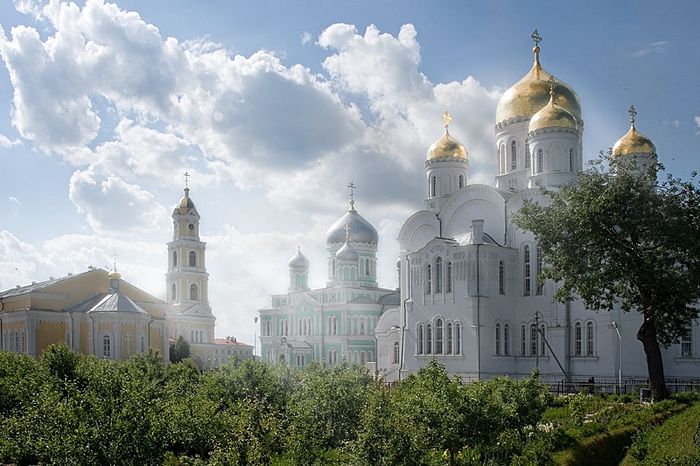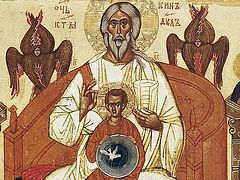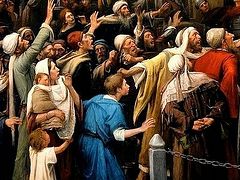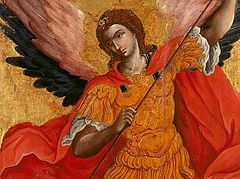Humanity has grappled with the mystery of integrity for ages. The question begged by the preceding statement is, “Integrity to what?” The historical integrity of man is fluid. All too often, integrity depended on an individual or a mob’s passions and whims.
As an example, history tells us that Rutilius Rufus1 was charged with crimes which he did not commit, yet he was convicted and exiled. Despite his singular attempt to maintain a life of truth, he was falsely accused and cast into oblivion. He incurred the hatred of powerful enemies within the Roman Empire. There are a multitude of similar examples of innocent men being devoured by evil.
By the time of Jesus, the power of a mob was evident.
Pilate addressed them once more, desiring to release Jesus; but they shouted out, “Crucify, crucify him!” A third time he said to them, “Why, what evil has he done? I have found in him no crime deserving death; I will, therefore, chastise him and release him.” But they were urgent, demanding with loud cries that he should be crucified. And their voices prevailed. So Pilate gave sentence that their demand should be granted. (Luke 23:20-24 RSV)
Pilate acceded to the mob.
History is replete with the martyrdom of Christians.
During the French Revolution, which so many still hail, the mob further increased in power, killing innocent religious such as the Martyrs of Compiègne.2 A similar type of mob pursued Orthodox clergymen when “more than a hundred and seventy thousand were arrested in 1917–1943; a hundred and fifteen thousand were shot.”3
Each mob throughout history was led by men of power, pursuing vain and perfidious self-interested acts.
True leaders have no need or want of mobs because they know that crowds cannot be controlled. If you do not believe the preceding read of Maximilien Robespierre.4
Mobs need not be large, only a few are necessary to be aroused to act by a person of perceived stature who dominates his crowd. I know because I was the subject of such a mentality wherein a villain said that I “should be shot for abandoning my post” and departing for the Russian Orthodox Church Abroad. Such acclamations are absent civility and context and reflect a greater evil in our world. Such acts are reflective of the secularization of Christianity and devoid of truth. Truth in today’s society means little. And when it creeps into Orthodox Christianity, irrespective of the level, its corroding effect is eternal lest it is expelled.
The broad spectrum of Christianity is today divided into three camps:5
-
the secular—evident by a lack of religious basis or institutions, albeit the moral foundations of secularism may have Christian roots;
-
2) the fragmented individualization of society wherein one relies on self-interest, perhaps best captured in the book, Eat Pray Love6 by Elizabeth Gilbert; and
-
3) the tradition of traditions, a biblical basis in which people conform to long-held traditions as opposed to traditions submitting to the individual.
It is the latter category, the tradition of traditions, to which I belong because I have seen the other two groups crucify men and women to serve the needs of the mob’s and individual’s vainglorious want. And, if I am to be crucified, I want it to be for my beliefs “in one, holy, catholic, and apostolic Church” and not in ostentatious contemptible behavior wherein boundaries of a legitimate alliance with God and the illegitimate became impossible to separate—creating a spiritual mauvais pas.7
The latter category, the tradition of traditions, is wherein Orthodox Christianity resides, alone and besieged, and now, apparently, malleable in the Hellenic world.
Orthodox Christianity is besieged by the former two categories to varying degrees, more by the secular than by the anarchic fragmented individualization of society. In the latter—the anarchic, we find the heresies of Joel Osteen and Oprah Winfrey, both richly indulgent and accountable to no one. The movement they represent is broad and variable in beliefs, allowing for great apostasies and New Age movements. The meaning of life is embedded in today and not eternity. Experience is fluid and absent coherency.
The secular movement that is grounded in laws—moral and state—both of which have Christian institutional roots. However, institutional Christianity is generally absent if not avoided, perhaps except for baptisms, marriages, and funerals. The Christian norms may be given a head-nod in many areas, except sex. Nothing is permitted to place boundaries on sexual behavior, which is self-defined as nothing more than a transaction—the transaction replaced the spiritual relationship. And sexual behavior is, today, defined as including the right to commit infanticide.
The danger of the preceding two ways of life—the secular and anarchic—is its permitting of darkness to abound. Obedience is to self. The very definition of integrity is to self, not to the Risen Christ.
The preceding two groups raise the question, “What is real?”
A profound danger exists when the “one, holy, catholic, and apostolic Church” begins to assimilate the thoughts, beliefs, and behaviors of either the secular and anarchic individualization of society. When men can lie and be supported in their lies by other men expecting earthly impunity, eschewing accountability to God, then a mob has been created. Delusions abound.
This deliberate syncretism undermines the “one, holy, catholic, and apostolic Church.” It undermines its credibility and integrity to the outside observer as well as those within the apostolic Church. As one individual so aptly stated, “I believe everything my Church teaches. I’m not certain my Church believes in the Church.”8 A significant reason for the preceding statement is the toleration of ambiguity. Ambiguity, which the Roman Catholic Church is presently experiencing, will nullify its apostolicity and possibly pillars of our Orthodox Christian faith.
Conflicts of power based on hypocrisy and self-promotion are antithetical to the “one, holy, catholic, and apostolic Church.” Orthodox Christianity must be courageous in a cosmic sense,9 beyond this life, to have real meaning.
It takes courage for the Church to be the Church in the face of militant individuals and mobs,10 atheistic11 and secularx12 powers. It is cowardice that succumbs to the powers of this world and the night it offers.
International politics or powers cannot solve the challenges facing us. Political forces can give you many things—as it has done for one local Orthodox Christian Church, but they cannot provide that specific local Church or its adherents meaning. The secular and anarchic individualization of society by their very nature deny meaning. The Church will lose sight of its raison d'être—the only Truth.
Knowledge of truth is thin. No one—not the hierarch who deemed I should be shot—nor a single local church has a singular claim on reality. That is why the local churches must operate in unison.
The adherents to the “one, holy, catholic, and apostolic Church” must educate its members, be a vibrant witness to the world, have healthy and vibrant families of apostolic integrity, and welcome others into God’s true fold. Our apostolic Church must eschew endless wars between the local churches, but always remember that the obligation of self-defense is permanent against the assaults of evil.
Lastly, we must never forget that Orthodox Christianity baptized Hellenism.




